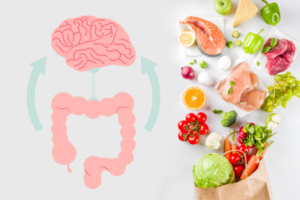08 Feb Nourishing Your Mood
Nourishing Your Mood: The Powerful Connection Between Nutrition and Emotional Well-being
In the hustle and bustle of our daily lives, it’s easy to overlook the profound impact that our diet has on our mental health. Beyond the physical benefits, the food we consume plays a crucial role in shaping our mood and emotional well-being. Let’s explore the fascinating connection between nutrition and mood, highlighting key nutrients and dietary habits that can positively influence your emotional state.
The Gut-Brain Connection
The gut is often referred to as the “second brain” due to its intricate connection with our central nervous system. Emerging research suggests that the microbiota in our gut can influence mood and behavior. Consuming a diet rich in fiber, probiotics, and prebiotics supports a healthy gut microbiome, potentially leading to improved mood and reduced feelings of stress and anxiety. “The gut-brain axis (GBA) consists of bidirectional communication between the central and the enteric nervous system, linking emotional and cognitive centers of the brain with peripheral intestinal functions. Recent advances in research have described the importance of gut microbiota in influencing these interactions.” [1]

Balancing Blood Sugar Levels
Balancing blood sugar is integral to maintaining stable mood and emotional well-being. Fluctuations in blood sugar levels can lead to mood swings, irritability, and feelings of fatigue. When blood sugar levels spike rapidly and then crash, it can trigger the release of stress hormones, impacting neurotransmitters like serotonin and affecting mood regulation. The foods we choose can have a significant impact on our blood sugar levels, affecting our mood and energy levels. Opting for balanced macronutrients including plenty of protein, healthy fats, and complex carbohydrates, such as whole grains, legumes, and vegetables, helps maintain stable blood sugar levels, preventing the energy crashes and mood swings associated with refined sugars. Consistent blood sugar balance is a key component in fostering a positive and resilient mood, as well as many other functions in the body.
Omega-3 Fatty Acids for Brain Health
Omega-3 fatty acids, found in fatty fish, flaxseeds, and walnuts, are essential for brain health. These fats play a role in the structure and function of brain cell membranes, influencing neurotransmitter function. Including omega-3-rich foods in your diet may contribute to improved mood and cognitive function. Check out our Brain Boost Foods with Snack Ideas blog post for more ideas here.

Hydration and Mood
Hydration plays a vital role in mood regulation and overall mental well-being. Dehydration can lead to feelings of fatigue, irritability, and difficulty concentrating, negatively impacting cognitive function. As the body loses water, it may struggle to efficiently transport nutrients and oxygen to cells, affecting brain function and mood stability. Staying adequately hydrated supports optimal physiological processes, aiding in the prevention of mood fluctuations and promoting a more positive and alert mental state. A well-hydrated body contributes to improved focus, cognitive performance, and an overall sense of well-being. Our general rule is to aim for 1/2 your body weight in ounces, but can vary depending on activity level, age, climate, dietetic intake etc. Herbal teas and infused water are excellent choices to add variety and flavor to your hydration routine.
Vitamins and Minerals for Mood Support
Certain vitamins and minerals play a key role in mood regulation. Vitamin D, often referred to as the “sunshine vitamin,” can be obtained from sunlight exposure and certain foods, contributing to overall well-being. B vitamins, found in leafy greens, eggs, legumes, and meats, are crucial for neurotransmitter synthesis and can impact mood.

Mindful Eating Practices
Mindful eating involves paying attention to the sensory aspects of food, fostering a more intentional and positive relationship with what we consume. By slowing down and savoring each bite, we will not only help digestion, but also enhance our enjoyment of meals and promote a mindful approach to nutrition. Making family meal time a priority also contributes to better mood around nutrition. From the Family Dinner Project: “The “magic” of family dinners is grounded in research on the physical, mental and emotional benefits of regular family meals.” [2]
Incorporating mindful and intentional nutrition choices can be a powerful strategy for promoting positive mood and emotional well-being. As we continue to unravel the intricate relationship between nutrition and mental health, embracing a balanced and nutrient-rich diet becomes not only a path to physical health but also a journey towards a happier and more emotionally resilient life!
Remember, small changes in your diet can lead to significant improvements in your mood and overall well-being. Take the time to nourish both your body and mind, and you’ll likely find yourself on a path to a more joyful and fulfilling life!
References:
[1] https://www.ncbi.nlm.nih.gov/pmc/articles/PMC4367209/#:~:text=The%20gut%2Dbrain%20axis%20(GBA,microbiota%20in%20influencing%20these%20interactions.
[2] https://thefamilydinnerproject.org/about-us/benefits-of-family-dinners/
The information provided on Nielsen Nutrition is for general informational purposes only. It is not intended to be a substitute for professional advice, diagnosis, or treatment. Always seek the advice of your physician or other qualified health provider with any questions you may have regarding a medical condition. This post may contain affiliate links, which means that we may earn a commission if you make a purchase through these links. This is at no additional cost to you and helps to support the maintenance and growth of the blog.






Sorry, the comment form is closed at this time.